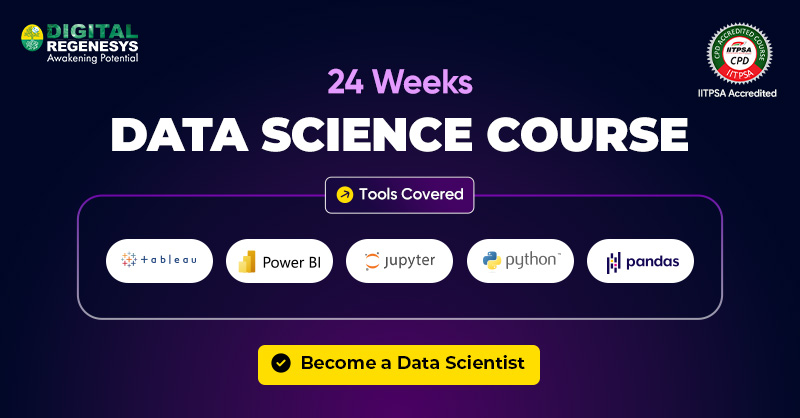Data Scientist Qualification in South Africa: Skills and Education Needed

The demand for skilled data scientists has grown significantly in recent years. Organisations across various sectors, including healthcare, finance, education, and retail, rely on data to make informed decisions.
This has created opportunities for individuals interested in statistics, technology, and analysis. The profession offers career growth, high salaries, and the opportunity to make meaningful contributions to business strategies. Many people are now considering this path as a long-term career option.
In this article, we will focus on the data scientist qualification in South Africa and outline the education path, skills, and certifications needed for success.
Overview of the Data Scientist Role
The role of a data scientist combines mathematics, statistics, and technology to extract meaning from complex data. These professionals work with both structured and unstructured information, turning it into valuable insights. By doing so, they help businesses improve efficiency, identify opportunities, and prepare for the future.
Data scientists are not only technical experts but also communicators who simplify complicated results for decision-makers. Their role has become essential as industries grow more data-dependent and competitive in modern markets.
Here are the primary responsibilities that define the data scientist role:
- Analysing complex datasets: Professionals clean, organise, and examine raw data to uncover patterns and relationships.
- Building predictive models: Using techniques like machine learning, data scientists create models that forecast outcomes.
- Communicating insights: Translating results into clear language allows decision-makers to apply findings effectively.
- Industry adaptability: Their skills are applied across multiple sectors, including banking, health, and retail.
- Problem-solving: They balance technical expertise with practical business understanding to tackle challenges.
Academic Qualifications
Formal education is the foundation of the data science career journey. Employers typically seek candidates with relevant university degrees or equivalent qualifications. Mathematics, statistics, and computing are considered core areas of study. Students interested in this field should carefully select subjects that strengthen analytical and technical abilities.
In South Africa, obtaining a degree remains one of the most crucial steps in securing a data science employment. While alternative paths exist, a structured academic route offers credibility and a deeper understanding of knowledge. Academic preparation also lays a solid foundation for further training through certifications or postgraduate studies.
The following academic qualifications are most relevant:
- Bachelor’s degree: The required degree for a data scientist in SA often includes mathematics, computer science, or information technology.
- Postgraduate qualifications: Many professionals pursue master’s degrees to specialise in advanced areas such as artificial intelligence or machine learning.
- An education path for a data scientist: Beginning with undergraduate studies and continuing with postgraduate work builds a strong foundation of expertise.
- Best subjects for data science: Mathematics, statistics, and computer science offer the strongest academic preparation, making them the best subjects for data science in SA.
- Alternative education: Some learners from non-technical fields enter the profession through structured training courses.
Preferred Degrees in South Africa
Employers often prefer specific academic backgrounds for candidates entering the field of data science. Mathematics, statistics, and computing are viewed as reliable pathways because they provide the technical knowledge needed for handling large datasets.
In South Africa, students pursuing a career in this field often choose these degrees to align with employer expectations. However, non-technical backgrounds can also transition into the field if individuals take supplementary courses.
A good balance of technical knowledge and problem-solving ability makes these degrees particularly valuable in the professional landscape of data science.
Here are some preferred degrees for aspiring data scientists:
- Mathematics and statistics: These fields strengthen logical thinking and quantitative analysis, essential for working with data.
- Computer science and IT: These degrees prepare students with programming and data management expertise.
- Engineering degrees: Some engineering backgrounds offer structured problem-solving skills, which are transferable to data science roles.
- Economics and finance: These backgrounds are helpful when applying data science in business or financial sectors.
Read more on How to Get Into a Data Science Career?- Find Out the Best Steps!

Certification vs Degree for a Data Scientist Qualification in South Africa
While degrees provide academic depth, certifications offer flexibility and practical exposure. Certifications are valuable for learners wanting to demonstrate specific skills in tools or methods. Employers in South Africa view both options positively, depending on the role requirements.
A combination of a strong degree and relevant certification often improves job prospects. Certifications also allow professionals from unrelated backgrounds to build credibility in the field.
Choosing between the two depends on individual career goals, time, and resources. Both paths contribute towards building a strong data scientist qualification in South Africa.
Here are the main differences between degrees and certifications:
|
Aspect |
Degree |
Certification |
|
Depth of Learning |
Provides broad theoretical knowledge and academic foundations. |
Focuses on specific tools, technologies, or practical skills. |
|
Time Commitment |
Typically, a bachelor’s degree requires 3–4 years of study. |
Can be completed in a matter of months, offering quicker results. |
|
Career Impact |
Builds long-term credibility and opens opportunities for senior roles. |
Demonstrates continuous learning and adds niche expertise to your profile. |
|
Cost |
Generally, higher tuition fees over several years. |
More affordable and flexible, with short-term investment. |
|
Flexibility |
Structured academic path with fixed timelines. |
Allows working professionals to study alongside existing commitments. |
|
Best For |
Students starting their educational path to become a data scientist in SA. |
Professionals enhancing skills or transitioning from non-technical backgrounds. |
Technical vs Soft Skills
Data scientists require a mix of technical expertise and soft skills. Technical skills cover programming, mathematics, and statistics. Soft skills include communication, critical thinking, and problem-solving.
Employers value professionals who can combine both, since technical results are only helpful if they can be applied in real-world contexts. This balance also enables professionals to work effectively in teams and collaborate with colleagues from diverse backgrounds.
A successful data scientist qualification in South Africa is therefore not only about technical learning but also about interpersonal abilities.
Here are the key skills to develop:
- Programming knowledge: Proficiency in Python, R, or SQL is essential for handling data effectively.
- Mathematics and statistics: Strong foundations support advanced analysis and accurate modelling.
- Critical thinking: The ability to approach problems logically enables the development of practical solutions.
- Communication skills: Presenting results clearly ensures non-technical teams understand insights.
- Collaboration: Working with diverse professionals requires adaptability and teamwork.
Read more on How to Start a Career in SQL: A Step-by-Step Guide.
Mathematics and Statistics Requirements for a Data Scientist Qualification in South Africa
Mathematics and statistics are central to data science. These fields provide the tools for interpreting information and drawing accurate conclusions. Many employers emphasise the importance of strong quantitative backgrounds when hiring data scientists.
Students considering this career should therefore focus on mathematics at school and university. Statistical knowledge is equally essential because it supports predictive modelling and hypothesis testing.
Understanding both fields helps professionals approach data logically and deliver valuable insights. In short, mathematics and statistics remain a cornerstone of the data scientist qualification in South Africa.
Here are the core requirements:
- Mathematical foundations: Topics such as linear algebra and calculus provide the mathematical basis for algorithm development.
- Statistical methods: Skills in probability, regression, and hypothesis testing are necessary for analysis.
- Mathematics is essential: The question “Do I need maths for data science?” often arises, and the answer is yes. Maths provides the foundation for algorithms, statistics, and modelling, making it essential in almost every stage of a data science career.
- Applied problem-solving: Maths and statistics help tackle practical business and scientific challenges.
- Quantitative confidence: A strong numerical background improves performance in advanced technical areas.
Read more on Data Scientist vs Data Analyst vs Business Analyst- Main Differences & Similarities!
Coding Languages to Learn for a Data Scientist Qualification in South Africa
Programming is one of the most important technical skills in data science. It enables professionals to collect, clean, and analyse data efficiently. Employers often seek candidates with experience in widely used languages. Programming also supports the development of algorithms and automation of processes, which are essential in data science projects.
Candidates should focus on languages that are in high demand within the industry for maximum employability. Gaining practical coding skills not only boosts career opportunities but also complements academic learning. This makes programming an essential component of the data scientist qualification in South Africa.
Here are the key coding languages:
- Python: Popular for its simplicity and extensive libraries in data science.
- R: Used for statistical analysis and visualisation tasks.
- SQL: Essential for managing and querying databases.
- Java: Useful for handling large-scale data processing.
- SAS: Often applied in industries such as healthcare and finance.
Read more on What is a Data Science Course? Learn Skills and Benefits.
Building a Data Science Resume
A strong resume effectively highlights both educational background and practical achievements. Employers in South Africa expect to see a clear record of qualifications, certifications, and projects. Practical experience through internships, research, or personal projects can set candidates apart.
Including skills in programming, mathematics, and statistics also strengthens a resume. Certifications demonstrate a commitment to continuous learning and ongoing professional development. A well-prepared resume ensures visibility in a competitive job market.
Therefore, building a resume is a crucial step in the data scientist qualification in South Africa.
Here are important elements for an effective resume:
- Academic background: Clearly state your degrees and specialisations.
- Certifications: Include essential certifications for a data scientist, such as those in machine learning or analytics.
- Practical projects: Showcase hands-on projects or case studies demonstrating your skills.
- Technical skills: Include coding languages, data handling tools, and statistical methods.
- Soft skills: Highlight communication, teamwork, and problem-solving abilities.
Conclusion
Becoming a data scientist requires a blend of education, technical skills, and soft skills. Academic qualifications remain the foundation, while certifications and practical experience add credibility to one’s expertise.
Mathematics, statistics, and coding form the technical base, while communication and teamwork strengthen overall performance. Understanding these requirements ensures candidates are better prepared for the challenges of the profession.
Ultimately, the data scientist qualification in South Africa involves a balanced approach to education and skills, allowing learners to succeed in a competitive environment.
At Digital Regenesys, learners can build strong foundations in data science through the dedicated data science certificate course. The course covers data analytics, machine learning, and programming, offering practical exposure through real-world projects.
It is designed for individuals seeking to acquire essential skills or enhance their existing knowledge. With flexible learning options, this course allows learners to grow professionally at their own pace. For anyone exploring the roadmap to become a data scientist in SA, this course provides valuable preparation.
Start building your data science skills with Digital Regenesys today.
Last Updated: 20 September 2025
